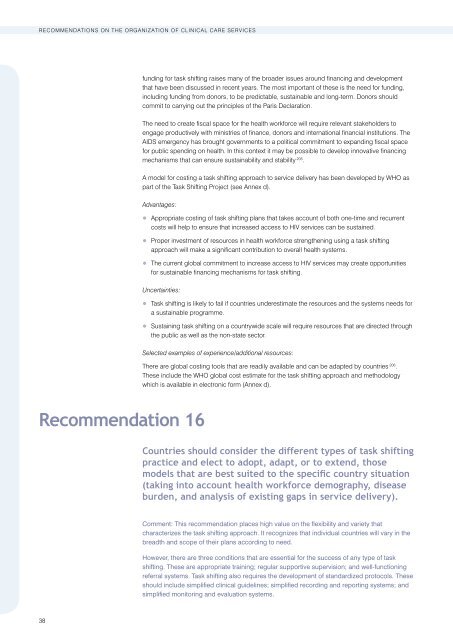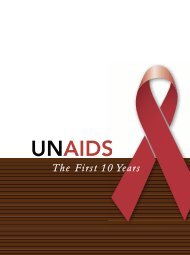Task Shifting - Global Recommendations and Guidelines - unaids
Task Shifting - Global Recommendations and Guidelines - unaids
Task Shifting - Global Recommendations and Guidelines - unaids
Create successful ePaper yourself
Turn your PDF publications into a flip-book with our unique Google optimized e-Paper software.
<strong>Recommendations</strong> on the organization of clinical care services<br />
funding for task shifting raises many of the broader issues around financing <strong>and</strong> development<br />
that have been discussed in recent years. The most important of these is the need for funding,<br />
including funding from donors, to be predictable, sustainable <strong>and</strong> long-term. Donors should<br />
commit to carrying out the principles of the Paris Declaration.<br />
The need to create fiscal space for the health workforce will require relevant stakeholders to<br />
engage productively with ministries of finance, donors <strong>and</strong> international financial institutions. The<br />
AIDS emergency has brought governments to a political commitment to exp<strong>and</strong>ing fiscal space<br />
for public spending on health. In this context it may be possible to develop innovative financing<br />
mechanisms that can ensure sustainability <strong>and</strong> stability 205 .<br />
A model for costing a task shifting approach to service delivery has been developed by WHO as<br />
part of the <strong>Task</strong> <strong>Shifting</strong> Project (see Annex d).<br />
Advantages:<br />
• Appropriate costing of task shifting plans that takes account of both one-time <strong>and</strong> recurrent<br />
costs will help to ensure that increased access to HIV services can be sustained.<br />
• Proper investment of resources in health workforce strengthening using a task shifting<br />
approach will make a significant contribution to overall health systems.<br />
• The current global commitment to increase access to HIV services may create opportunities<br />
for sustainable financing mechanisms for task shifting.<br />
Uncertainties:<br />
• <strong>Task</strong> shifting is likely to fail if countries underestimate the resources <strong>and</strong> the systems needs for<br />
a sustainable programme.<br />
• Sustaining task shifting on a countrywide scale will require resources that are directed through<br />
the public as well as the non-state sector.<br />
Selected examples of experience/additional resources:<br />
There are global costing tools that are readily available <strong>and</strong> can be adapted by countries 206 .<br />
These include the WHO global cost estimate for the task shifting approach <strong>and</strong> methodology<br />
which is available in electronic form (Annex d).<br />
Recommendation 16<br />
Countries should consider the different types of task shifting<br />
practice <strong>and</strong> elect to adopt, adapt, or to extend, those<br />
models that are best suited to the specific country situation<br />
(taking into account health workforce demography, disease<br />
burden, <strong>and</strong> analysis of existing gaps in service delivery).<br />
Comment: This recommendation places high value on the flexibility <strong>and</strong> variety that<br />
characterizes the task shifting approach. It recognizes that individual countries will vary in the<br />
breadth <strong>and</strong> scope of their plans according to need.<br />
However, there are three conditions that are essential for the success of any type of task<br />
shifting. These are appropriate training; regular supportive supervision; <strong>and</strong> well-functioning<br />
referral systems. <strong>Task</strong> shifting also requires the development of st<strong>and</strong>ardized protocols. These<br />
should include simplified clinical guidelines; simplified recording <strong>and</strong> reporting systems; <strong>and</strong><br />
simplified monitoring <strong>and</strong> evaluation systems.<br />
38

















